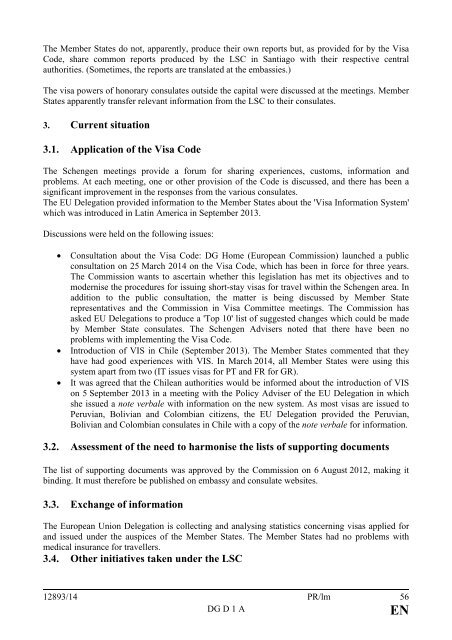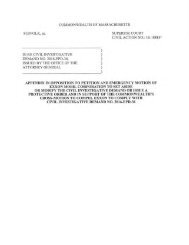eu-com-schengen-coop
eu-com-schengen-coop
eu-com-schengen-coop
Create successful ePaper yourself
Turn your PDF publications into a flip-book with our unique Google optimized e-Paper software.
The Member States do not, apparently, produce their own reports but, as provided for by the Visa<br />
Code, share <strong>com</strong>mon reports produced by the LSC in Santiago with their respective central<br />
authorities. (Sometimes, the reports are translated at the embassies.)<br />
The visa powers of honorary consulates outside the capital were discussed at the meetings. Member<br />
States apparently transfer relevant information from the LSC to their consulates.<br />
3. Current situation<br />
3.1. Application of the Visa Code<br />
The Schengen meetings provide a forum for sharing experiences, customs, information and<br />
problems. At each meeting, one or other provision of the Code is discussed, and there has been a<br />
significant improvement in the responses from the various consulates.<br />
The EU Delegation provided information to the Member States about the 'Visa Information System'<br />
which was introduced in Latin America in September 2013.<br />
Discussions were held on the following issues:<br />
<br />
<br />
<br />
Consultation about the Visa Code: DG Home (European Commission) launched a public<br />
consultation on 25 March 2014 on the Visa Code, which has been in force for three years.<br />
The Commission wants to ascertain whether this legislation has met its objectives and to<br />
modernise the procedures for issuing short-stay visas for travel within the Schengen area. In<br />
addition to the public consultation, the matter is being discussed by Member State<br />
representatives and the Commission in Visa Committee meetings. The Commission has<br />
asked EU Delegations to produce a 'Top 10' list of suggested changes which could be made<br />
by Member State consulates. The Schengen Advisers noted that there have been no<br />
problems with implementing the Visa Code.<br />
Introduction of VIS in Chile (September 2013). The Member States <strong>com</strong>mented that they<br />
have had good experiences with VIS. In March 2014, all Member States were using this<br />
system apart from two (IT issues visas for PT and FR for GR).<br />
It was agreed that the Chilean authorities would be informed about the introduction of VIS<br />
on 5 September 2013 in a meeting with the Policy Adviser of the EU Delegation in which<br />
she issued a note verbale with information on the new system. As most visas are issued to<br />
Peruvian, Bolivian and Colombian citizens, the EU Delegation provided the Peruvian,<br />
Bolivian and Colombian consulates in Chile with a copy of the note verbale for information.<br />
3.2. Assessment of the need to harmonise the lists of supporting documents<br />
The list of supporting documents was approved by the Commission on 6 August 2012, making it<br />
binding. It must therefore be published on embassy and consulate websites.<br />
3.3. Exchange of information<br />
The European Union Delegation is collecting and analysing statistics concerning visas applied for<br />
and issued under the auspices of the Member States. The Member States had no problems with<br />
medical insurance for travellers.<br />
3.4. Other initiatives taken under the LSC<br />
12893/14 PR/lm 56<br />
DG D 1 A<br />
EN












